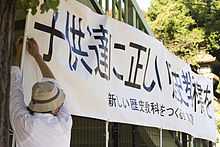Whitewash (censorship)
To whitewash is a metaphor meaning to gloss over or cover up vices, crimes or scandals or to exonerate by means of a perfunctory investigation or through biased presentation of data.[1] It is especially used in the context of corporations, governments or other organizations.
Etymology
Its first reference dates back to 1591.[1] Whitewash is a cheap white paint or coating of chalked lime used to quickly give a uniform clean appearance to a wide variety of surfaces, for instance, the entire interior of a barn. In 1800, the word was used in a political context, when a Philadelphia Aurora editorial said that "if you do not whitewash President Adams speedily, the Democrats, like swarms of flies, will bespatter him all over, and make you both as speckled as a dirty wall, and as black as the devil."[2]
Modern usage
Many dictatorships and authoritarian states, as well as democratic countries, have used the method of whitewash in order to glorify the results.
Later, during the Soviet invasion of Czechoslovakia following the Prague Spring of 1968, the Press Group of Soviet Journalists released a collection of "facts, documents, press reports and eye-witness accounts," which was promptly nicknamed "The White Book" both for its white cover and its attempts to whitewash the invasion by creating the impression that the Warsaw Pact countries had the right and duty to invade.
North Korean radio broadcasts claim to have an abundance in food supplies, yet the government receives food aid from foreign states.[3]

Japan is accused of whitewashing its history of warfare and imperialism by omitting or minimizing subjects such as the Nanking Massacre in textbooks.[4]
In the study of reputation systems by means of algorithmic game theory, whitewashing is used to refer to an agent abandoning their tarnished identity and re-creating a new blank one,[5] in what is more widely known in Internet slang as sockpuppeting.
The text of The New Jim Crow has been identified as being whitewashed due to the bias of its conceptual framework, which omits pertinent African American people and history, as well as politically radical ideas in favor of a more conventional and mainstream perspective. Critics maintain that the text has been whitewashed for white middle-class consumption.[6][7]
Fictional usage
Novels by George Orwell have dealt with the subject of whitewash as well. In Animal Farm, the pig Napoleon tries to whitewash history by deleting a few characters from the minds of the other animals. This was perceived as a direct reference to the USSR under Stalin. The protagonist of his novel Nineteen Eighty-Four, set in a totalitarian dictatorship, is employed as a routine falsifier of the historical record to ensure that it is always in keeping with the party line.
Related terms
- Greenwashing describes the practice of companies spinning their products and policies as environmentally friendly, or "green".[8][9]
- Bluewashing is used to describe either publicity-driven humanitarian relief efforts, or efforts to be perceived as having a small water footprint.
- Pinkwashing has two meanings. It is used to describe the practice of companies connecting their products to breast cancer awareness and fundraising, often while ignoring the ways their products may be contributing to cancer through the materials used in production.[10]
See also
References
- "Censorship". New World Encyclopedia. 2008. 678660. Retrieved 17 November 2013.
- ↑ 1.0 1.1 "Whitewash", Encyclopædia Britannica, 2003 DVD Ultimate reference suite.
- ↑ Philadelphia Aurora (July 21, 1800), cited in the New World Encyclopedia
- ↑ Dafna Linzer (2005-06-23). "U.S. Offers Food Aid to N. Korea". The Washington Post. Retrieved 2006-10-27.
- ↑ "China Raps Japanese Politician for Whitewashing History". Retrieved 2006-10-27.
- ↑ Noam Nisan; Tim Roughgarden; Eva Tardos; Vijay V. Vazirani (2007). Algorithmic Game Theory. Cambridge University Press. p. 682. ISBN 978-0-521-87282-9.
- ↑ Joseph D. Osel (2012-04-07). "Black Out: Michelle Alexander's Operational Whitewash". International Journal of Radical Critique. Retrieved 2012-05-12.
- ↑ Thomas, G. "Why Some Like The New Jim Crow So Much" Vox Union, 2012: http://www.voxunion.com/why-some-like-the-new-jim-crow-so-much/?pagewanted=all
- ↑ "Terrachoice.com - Definition of Greenwashing". terrachoice.com. Archived from the original on August 28, 2008. Retrieved November 17, 2013.
- ↑ "LP: 'The biggest environmental crime in history'". Libertypost.org. 10 December 2007. Retrieved 2013-11-17.
- ↑ "'Think Before You Pink'". Thinkbeforeyoupink.org. 2007-03-27. Retrieved 2013-11-17.
External links
- The Commissar Vanishes - site explaining the whitewashes by Stalin.
- A Quotation from Adolf Hitler
